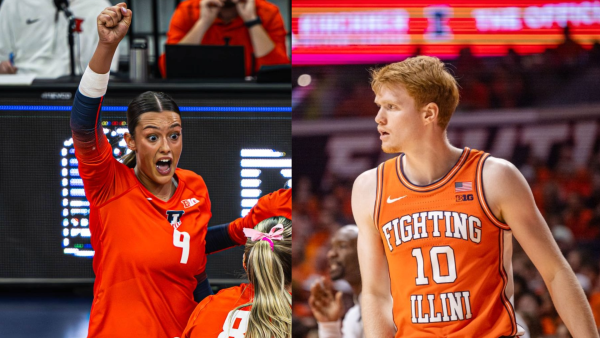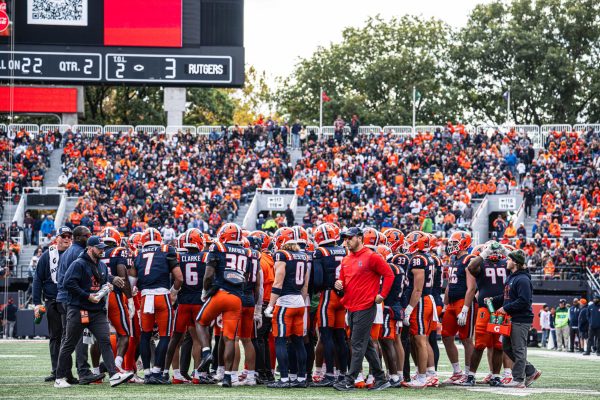Online backlash sheds light on common microaggressions
Jan 28, 2014
On Sunday afternoon, I almost wrote a column about the “microaggressions” inspired by a post I saw on Facebook where a Caucasian female wished “her craziest Asian friend” a happy birthday.
The inclusion of the “Asian” qualifier bothered me because such a qualifier would likely never be used for a white friend. This also wasn’t the first time I witnessed such a post on social media.
I eventually decided to write about a different issue that seemed more relevant at the time.
Little did I know that, hours later, a perfect storm of bad weather and an email would bring this issue to the forefront of this very campus.
At 9:32 p.m. on Sunday, Chancellor Phyllis Wise sent a massmail to the campus community informing us that classes and University operations would “proceed as scheduled.” This type of email is not out of the ordinary, but it quickly ignited outrage from the student body as the forecast called for sub-zero temperatures and extreme winds.
Get The Daily Illini in your inbox!
The backlash began with predictable outrage on social media sites followed by a petition that was circulated by a student named Matthew Hill through Change.org, in hopes of prompting Chancellor Wise to reconsider the decision to keep campus in operation. Even if the goal was fruitless, this was a mature way to organize the student body in a grass roots manner. It was spread with the clever social media hashtag “#Wise2Cancel,” leveraging the Chancellor’s own last name against her decision that students seemingly felt was “unwise” considering the weather forecast.
To this point, the situation had not been exceptionally noteworthy.
Then, it spiraled out of control.
Students began using a different hashtag.
The hashtag? #FuckPhyllis. Hateful? Yes. Did it end there? No.
It was quickly eclipsed by racist and misogynistic content that many of the tagged tweets included.
“Phyllis Wise is the Kim Jong Un of chancellors #fuckphyllis,” stated one student.
“In a room with Phyllis Wise, Adolf Hitler, and a gun with one bullet. Who do I shoot? #fuckphyllis,” questioned another.
One minute, Chancellor Wise was the focus of a safety-minded petition seeking to reverse a decision she likely made with a team of administrators. Within an hour, a smaller collection of students compared her to the man who led the mass execution of millions of people and the current, suppressive leader of North Korea.
Such comparisons are beyond hyperbolic, but the fact that most were rooted in race and gender-based insults was even more troubling.
And remember, it was all over the decision to not cancel classes — which students can (and often do) easily skip on their own accord.
In that same time, a fake, now-deleted, Twitter account was created that began to spout off an array of inappropriate tweets. It is unclear who was behind the obvious parody account, but they were able to successfully use the Chancellor’s identity to spew venomous words.
For most bystanders, the progression of these events was dizzying and their nature was appalling.
Suey Park, an alumna of the University, took note of what was happening and launched a remarkable pushback on the use of the hashtag, drawing attention to the hatred that was transpiring. She was able to do so by using the inappropriate hashtag to call out people spewing vitriolic hatred at Chancellor Wise.
This was followed by a now-viral post on BuzzFeed that justifiably called out the perpetrators.
What started as a widely-supported and calm opposition devolved into an embarrassing and offensive display of hatred from a small portion of students.
In the process, the ugly truth about an issue that has existed for a long time emerged: the frequent and seemingly “micro” aggressions that students of minority backgrounds face. Normally, such occurrences are masked by “humor,” subtlety and a general lack of serious concern for their existence.
The aforementioned Facebook birthday post between friends was a perfect example of how sometimes people can insult even close friends by inserting race into the discussion. In the case of Chancellor Wise, hateful tweets pertaining to her race and gender (which at no point were small or harmless) became large-scale macroaggressions after being broadcast on Twitter for the world to see.
As with any dark hour, a silver lining has presented itself.
We now have the opportunity to turn fresh shock and awareness for this subject into thought, discussion and, eventually, progress.
Ms. Park and the BuzzFeed post were right to call out students who spewed such hateful aggressions. Unfortunately, the piece also quoted Ms. Park as she (wrongly) connected the insensitive attacks on Chancellor Wise to the 2011 stabbing of a Sikh law professor at the University. Comparing Sunday’s debacle to a race-based hate crime (fueled by mental illness) changes the conversation from being about the all-too-common everyday aggressions minorities face to something it’s not.
Their important message was further diluted with the inclusion of the Change.org petition in their complaints and the insinuation that the students in question represent the entirety of this campus. These distortions distract and hinder the meaningful discussion that must now happen.
With that in mind, it is our duty to learn from this and continue these meaningful discussions in our classes, in our homes and, yes, even online.
Chancellor Wise deserves better. Students of minority backgrounds deserve better. This University deserves better.
John is a senior in Media. He can be reached at [email protected]. Follow him on Twitter @JohnBuysse.





